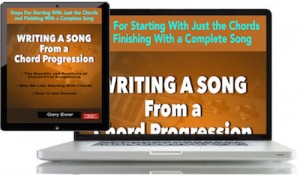I came across an article in my Twitter feed this morning, though it’s been out there for a couple of weeks, and you may have seen this already. “Songwriting: Why it takes more than two to make a hit nowadays” discusses why today’s hits seem to have such a long songwriter credit list, while a couple of generations ago, songs typically had one, possibly two, credited songwriters.
As they imply in the article, I don’t think the method of writing has really changed all that much, it’s more an issue of who is getting the credit. In the 60s, a band member might suggest a small modification to something in a song, but that didn’t necessarily mean that they got credit for that. Today, though, as the author of the article, Mark Sutherland, says, “even just ‘being in the room’ when the magic happens can get you on the list.”
 Get “The Essential Secrets of Songwriting” eBooks. They’ll help you polish your technique, and make you the best songwriter you can be. Comes with a Study Guide, tons of chord progressions, and information covering every aspect of how to write good music.
Get “The Essential Secrets of Songwriting” eBooks. They’ll help you polish your technique, and make you the best songwriter you can be. Comes with a Study Guide, tons of chord progressions, and information covering every aspect of how to write good music.
This is only my opinion, and I fully understand that others do not hold the same view, that just because someone’s suggestion for a changed word is accepted in the final version should not necessarily mean that they receive a songwriting credit.
I think the reason for inflated credit lists is a preemptive attempt to avoid any future legal proceeding from someone who might feel that they deserve some credit. And also, I fully admit that the whole area of songwriting credit can be a murky one. At what point should one get credit? If they suggested changing the word “the” to “that”, I say no. But changing an entire line… we’re getting into something a bit more substantial.
Group Songwriting
Some bands, like “Genesis,” always had a policy of crediting everyone in the group as songwriters. That avoided any kind of “who actually wrote this” question, but it also acknowledged their approach to songwriting. Someone would bring an idea to the rehearsal, and everyone would contribute to its final version. How much each individual musician contributed was an issue they chose not to deal with. Today’s songwriting method, at least the one that produces many hit songs, isn’t much different: several musicians in the room, all contributing to varying degrees on what the song will eventually be.
But the article begs the question: is the traditional view of a songwriter as someone sitting on the edge of their bed with a guitar on their lap just not valid anymore? Is anyone still writing songs like that?
Well, they may not be on their bed — they may be sitting somewhere with an iPad or iPhone, singing ideas to themselves and making digital notes about songwriting ideas, but I think the notion of one person with a vision is definitely still one that works. The specifics of the process may be different, but songwriting as a sole person’s creative outlet is as alive as it ever was.
As a songwriter, I think it’s important to not obsess over how hit songs are being produced in a studio. A song that the contributors hope will be a hit on the Billboard Hot 100 are being written to adhere to the latest formula to achieve that goal. Chords, melodic shape, tempo, beat, sound, and choice of words in the lyric… there is little that’s truly original, and much that’s written to conform to what will please an audience immediately.
So if you’re still working out your songs on the edge of your bed, or with your iPad in hand, don’t stop what you’re doing. Songwriting that’s one person with a vision is still alive and kicking.
 Written by Gary Ewer. Follow Gary on Twitter.
Written by Gary Ewer. Follow Gary on Twitter.
 If you like starting songs by working out a good chord progression, you need to get “Writing a Song From a Chord Progression.” It shows you the strengths and pitfalls of this very common songwriting process.
If you like starting songs by working out a good chord progression, you need to get “Writing a Song From a Chord Progression.” It shows you the strengths and pitfalls of this very common songwriting process.











With respect the Music of Mozart was in an age when recordings and
radio were not invented, Even so Mozart was also influenced by other
composers in much the same way as we all are
Today Hits are made via the Radio and T V ,
No one writes in a Vacum And no Artistic person Performs In A Vacum
I’m no grand master, but I am an artist and I view songwriting as an art. To me, “art” is something very personal and something you do alone. For this (and other reasons) I’ll probably never have a hit song, but ask yourself … did Mozart ask for help from Salieri? Absolutely not. And somehow I can’t imagine Van Gogh inviting Gauguin to add a sunflower to a painting nor da Vinci giving Michelangelo a shot at one of the disciples in The Last Supper….
Hi Judson:
I agree with you. I think there are songwriting partnerships that work famously well, but only as long as an initial vision is shared, and that’s a tall order.
-Gary